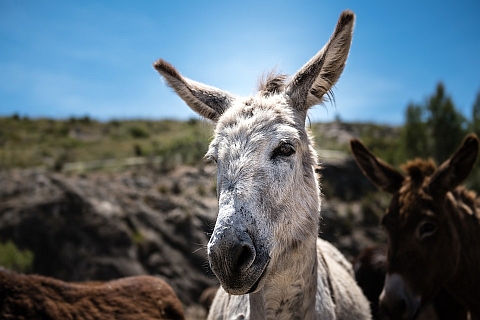
A Muslim told me that he believes there is a conspiracy in the Bible to suppress the name Ishmael in favor of Isaac.
Did you know that, in fact, Abraham also had other sons? The Bible even names them! Why should the Bible tell us even more more names if only to suppress them if there was a conspiracy to promote Isaac? The fact is the Bible says it as it is. Good or bad.
Isaac had two sons. Jacob and Esau. Jacob rises to prominence while Esau’s name fades away. Is there also a conspiracy to suppress Esau too?
We know Abraham loved Ishmael. The Bible says it. But he was not the chosen one.
Here is the point. In the Bible, it is all about the line of the Messiah.
In the larger scheme of the Bible, Ishmael and Esau were inconsequential in the line of the Messiah. They existed, they were someone’s son and brother but were not chosen to be in the line of Messiah.
Isaac or Ishmael? The Messiah can only come through one of them. Jacob or Esau? The Messiah can only come through one of them. That’s how God intended
it.
Did you know Isaac actually preferred Esau, the older son, over Jacob? But that doesn’t matter. It’s God’s plan that matters. He chose Isaac.
God isn’t called the God of Abraham and Lot and Ishmael and Isaac and Esau and Jacob (though He is). He is called the God of Abraham, Isaac and Jacob, signifying the specific, direct Messianic line.
Jacob had 12 sons. The Messiah can only come through one of them. There is no plot to suppress anyone else. Everyone had a role but the Messiah came through the line of Judah son of Jacob, as did King David. That is why titles for Messiah include “Lion of Judah” and “Son of David”.
The OT does not just tell us the story of Israel but more importantly, anticipates the coming Messiah. That is why names and genealogies are so important in the Bible. History and prophecies of the OT, everything points to the Messiah.
Jesus said this precisely in Luke 24.
“He (Jesus) said to them, “This is what I told you while I was still with you: Everything must be fulfilled that is written about me in the Law of Moses, the Prophets and the Psalms.” (v.44)
And beginning with Moses and all the Prophets, he explained to them what was said in all the Scriptures concerning himself. (v.27)
There are hundreds of prophecies…e.g.
700 years before Messiah was born, Isaiah prophesied He would be born of a virgin. (Isaiah 7:14)
500 years before Messiah was born, Micah prophesied He would be born in Bethlehem. (Micah 5:2)
1000 years before Messiah was born, David prophesied the kind of death he would suffer. (Psalms 22)
And Jesus FULFILLED them all.
The OT, over 1500 years in the making, anticipates the coming Messiah. In fact, that is how the OT ends in Malachi, with God saying: “I will come to you.”
400 years later, the NT opens with Matthew reciting some genealogy. Boring…??
But wait a minute. Do you realize what Matthew is actually saying.
He was essentially saying, “L I S T E N….THIS.IS.IT! THE ONE WE HAVE BEEN WAITING FOR IS FINALLY HERE!”
Do you see it? Do you understand why we believe there can be no other “new” message or “messenger” to a people a thousand miles away especially through someone who is not even in the line of Messiah. Messiah is the final and ultimate one. There is no room for anyone else. It is all completed and fulfilled.
Do you see that in the big picture, Ishmael is inconsequential.
By the way, the NT ends the same way the OT ends. In anticipation of His coming. Again.
“Yes, I am coming soon.” (Revelation 22:20)
++++++++++++++++++++++++++++++++++
“He will be a wild donkey of a man; his hand will be against everyone and everyone’s hand against him, and he will live in hostility toward all his brothers.” Genesis 16:12
Muslims say that the Bible insults Ishmael here by calling him a “wild donkey”. That is inaccurate.
To a 21st century mind, it might sound like an insult. However, I do not think there is such an intention here if you understand the context correctly.
The Bible is simply attributing characteristics of the animal to him. Positive traits, as well as negative.
One of Jacob’s son, Issachar, is called “a strong donkey” by Jacob. (Gen 49:14)
Was Jacob insulting his son? Are the descendants of Issachar accusing the Bible of insulting them? No.
Here “strong donkey” emphasizes the strength of his descendants, it also indicates that like a donkey, a beast of burden, they will be forced to work for others. So you see, positive as well as negative traits.
In the same chapter, Issachar’s brother, Benjamin is called “a ravenous wolf”. An insult?
The image of a wolf reveals that the descendants of Benjamin will be aggressive warriors. This prophecy came to pass as shown by verses like 1 Chronicles 8:40
Naphtali is likened to a doe. Dan is likened to a snake. Joseph like a lion’s cub. (Read it all in Genesis 49).
The Bible is not calling them animals or that they look like or smell like animals but conveying both the positive and negative attributes.
So in Genesis 16:12, Ishmael is likened to a “wild donkey”. What does it mean?
It is saying Ishmael and his descendants will become strongly independent. Not servile toward others. That’s positive.
But there’s also a negative. He will live a life of hostility toward others because of his character.
Do you see that in his descendants today?